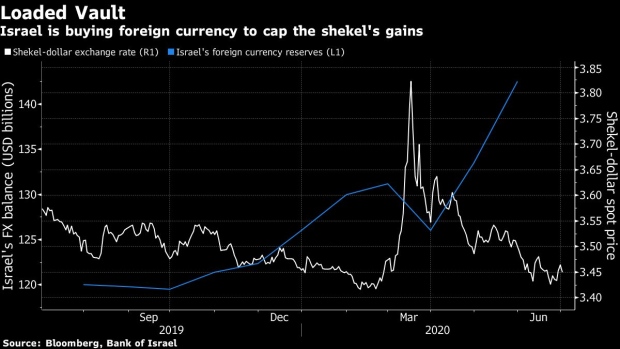Jul 5, 2020
Israel Looks for Answers to the Second Virus Wave
, Bloomberg News

(Bloomberg) -- Just over a month after turning more upbeat on the economy, the Bank of Israel is still unlikely to tinker with its near-zero interest rates even as it confronts a renewed surge in Covid-19 cases and strengthening shekel.
Coronavirus infections plummeted after the government imposed a near-total shutdown from mid-March through late April, but opening up the economy has brought the disease back to new daily highs. The second wave of contagion is almost certain to complicate plans by the central bank to step aside in favor of a primarily fiscal response to the crisis, forcing investors to reassess its appetite for market intervention.
While analysts surveyed by Bloomberg unanimously expect the monetary committee on Monday to leave the key rate at an all-time low of 0.1%, it may follow the U.S. Federal Reserve and consider more policy guidance or discuss a commitment to limit the yields on government bonds.
“What we could see is a more clear and sort of forceful forward guidance regarding future government bond purchases and yield curve control, which is the big topic these days,” said Jonathan Katz, an economist for Tel Aviv-based Leader Capital Markets Ltd., who expects no change to the benchmark rate this week.
Since March, the Bank of Israel rolled out a series of crisis programs to boost liquidity and credit including 50 billion shekels ($14.6 billion) of government bond purchases. Officials have raised the possibility of expanding the program or broadening it to include corporate debt.
The Bank of Israel’s forecasts are also in focus after its research staff in May improved this year’s outlook to a 4.5% contraction of gross domestic product. New macroeconomic forecasts will follow Monday’s decision, alongside a news conference by Governor Amir Yaron.
The renewed rise in virus cases and accompanying partial lockdowns -- combined with the International Monetary Fund’s recent global downgrade -- has economists bracing for slower Israeli growth forecasts this year and next.
‘Truly Scary’
“The economic results are truly scary,” said Victor Bahar, chief economist at Bank Hapoalim Ltd. He expects the Bank of Israel to cut its growth forecasts for this year and next “because of the second wave and the data. We’re not seeing the jobs market recover.”
Alongside a worsening outlook for the economy, the central bank also has to contend with the steepest annual fall in consumer price since 2004. Over the past month, the shekel has appreciated over 1% against the dollar, increasing fear that it could further limit inflation and hurt exporters.
In recent days, officials have stepped up their warnings on the appreciation. The Bank of Israel has already ramped up its program of foreign-currency purchases designed to weaken the shekel and rouse inflation. But despite tripling the amount it bought to $2.6 billion in May, consumer prices fell an annual 1.6% to stay below zero for a second month.
Beyond a stronger signaling of its resistance to shekel gains, the central bank’s options are limited unless it’s willing to carry out unsterilized currency intervention, an operation that Yaron has said remains a possible tool.
Some economists also believe there’s a good chance that the Bank of Israel will cut its key rate to zero at approaching meetings -- or possibly even on Monday -- though policy makers are hesitant to enter negative territory.
“The focus now needs to be mostly on the shekel,” said Rafi Gozlan, chief economist for Israel Brokerage and Investments Ltd. in Tel Aviv, who sees a 50% chance for a rate cut to zero. Foreign exchange is where the Bank of Israel “can be more effective and influence the economy -- it can be more aggressive there.”
©2020 Bloomberg L.P.